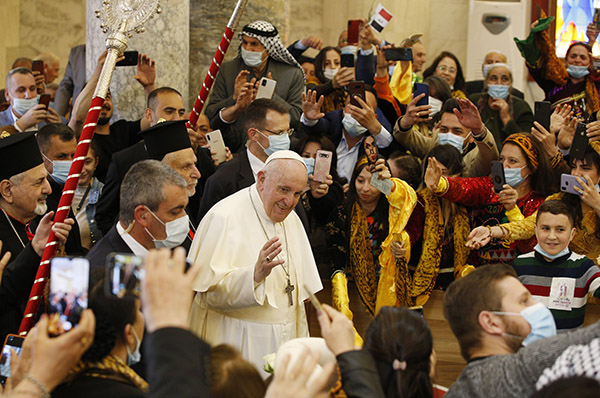
By Inés San Martín
QARAQOSH, Iraq (Crux) — Although the impact of papal trips is often hard to assess in the immediate aftermath, such cautions mean little to the leader of Iraq’s local Catholic church, who quickly proclaimed Pope Francis’s March 5-8 visit to his nation a “miracle” on Sunday.
“The mentality, the culture, has began to change,” Cardinal Louis Raphael Sako told journalists on Sunday, as he was waiting for Pope Francis to arrive in Qaraqosh from Mosul, two cities devastated by the terrorist from Islamic State between 2014 and 2017.
“First, the waiting for the pope, and then his presence, have produced a miracle,” Cardinal Sako said.
He argued that the situation for Christians in Iraq, where ISIS perpetrated genocide and where those who follow Jesus have long suffered discrimination, often treated as second class citizens, is changing.
“The situation has changed already, everyone is talking about us now, about the history of Christians in Iraq and the Middle East, saying ‘the land was theirs, we arrived later,’ [using] a completely different language of respect towards Christians, encouraging Christians to stay, to build trust,” he said.
Archbishop Youhanna Jihad Mtanos Battah, Syriac archbishop of Damascus, agreed: Everyone is very happy to welcome the pope, and “this trip is very important for dialogue. It’s a letter for peace.”
“Iraq has suffered a lot,” he told reporters. “They have lived so many wars… So a little strength, a little courage is needed for this people that is waiting to rebuild Iraq. It’s a very important visit.”
Archbishop Mtanos Battah added that Syria too is now awaiting the pope, because “the war is almost over.”
The two prelates separately spoke to journalists in the Church of the Immaculate Conception, in Qaraqosh, the largest Christian city in Iraq, located in the Nineveh Plain, a stretch of land between Iraq’s north and Kurdistan, the autonomous northern region. The had been inside, but left the church together, towards the courtyard to take a picture with one another, clearly happy to see each other.
The archbishop was in Qaraqosh, some 200 miles from the Syrian border, exclusively for the pope’s visit, and defined Pope Francis’ stop in this city as “Palm Sunday in advance.”
Asked about the possibility of Christianity disappearing from the Middle East, an idea often floated by Christian leaders, particularly since the rise of ISIS, the Syrian profusely rejected the notion.
“We have been here, and we will stay here,” he said. “The Middle East without Christians becomes very dangerous. The international community needs to help Christians to remain in their own countries. This is very important.”
“We are here. We are few, but we are here. This is important,” he insisted, noting that Christians can be “bridges” with Muslims, as is the case of Cardinal Sako, who “invited the pope, an important person, and he came to Iraq. And this is for all of Iraq, important.”
He also urged the international community to help Christians stay in the Middle East instead of migrate, jokingly saying that it’s “less expensive.”
Concerning a possible visit to Syria, Archbishop Mtanos Battah said that “all of us await the visit of Pope Francis. Pope John Paul II came in 2001. It’s possible, I don’t see why not.”
After a reporter pointed out that when the Polish pope was in Syria, there wasn’t an ongoing war- as has been the case in now, with a conflict that has been going on for almost ten years, the archbishop argued that the fighting is still only going on in the Northeast, but cities such as Damascus and Aleppo are peaceful.
“We’re almost at the end of the war,” he said. “And the visit would give us peace. Everyone loves this pope, because he’s open. Even Muslims have welcomed the pope.”
Cardinal Sako went on to say that the joy for this historical visit in such a complicated moment is palpable all throughout the Iraq, among Christians, Muslims and people of other faiths.
“He brought us comfort, hope, but also fraternity,” he said. “Everyone is moved.”
Referring to another history-making moment of the trip, the pope meeting with Shia leader Ali al-Sistani, Cardinal Sako said that the Grand Iman had told the pontiff that he hadn’t been able to welcome corrupt politicians in the city of Najaf, considered holy for Shites, but that the papal visit was “historic,” reiterating that “fraternity between Christians and Muslims is needed,” as is thinking about the youth, “because they are the future of the world.”
According to the cardinal, Pope Francis said this was a “pilgrimage of peace,” that it’s “necessary for all to convert to God, and to think about humanity not sectarianism.”
Pope Francis wrapped his March 5-8 visit to Iraq with a Mass in Erbil, the capital of Kurdistan. With a crowd estimated at 10,000 people, that had little to no intention of upholding anti-COVID-19 measures, he promised that Iraq “will always remain with me, in my heart.”
“I ask all of you, dear brothers and sisters, to work together in unity for a future of peace and prosperity that leaves no one behind and discriminates against no one. I assure you of my prayers for this beloved country,” he said. “In a particular way, I pray that the members of the various religious communities, together with all men and women of good will, may work together to forge bonds of fraternity and solidarity in the service of the common good and of peace.”
